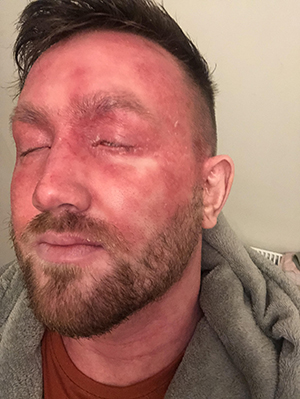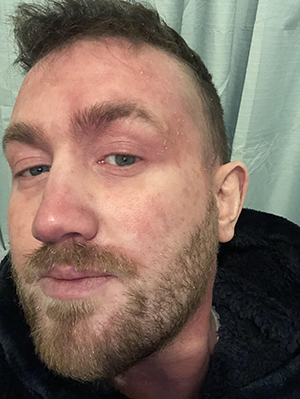Ryan's Experience Trying Different Pharmaceutical Treatments
Having come from a skeptical background, it took me a long time before trying Dupixent. I weighed out many pros and cons, finally conceding that my journey may very well benefit from the help of a pharmaceutical drug. It did.
But, not everyone is as reserved as I am. Some are ready to give things a try, especially if it helps others down the road.
What has Ryan's eczema journey been like?
Ryan, from Leicester, UK, has tried many different treatments on his eczema/TSW journey.


Growing up, he always used heavy steroids, even at the age of three. As it got worse, it was deemed severe eczema, but looking back, Ryan can see it was far worse. And because of the way his skin presented at such a young age, he tried every pharmaceutical treatment under the sun.
What treatments has Ryan used?
At twenty seven now, Ryan lists off the years and what he's tried.
In 2009, it was azathioprine, an oral immunosuppressant. In 2010, he was moved to a more powerful immunosuppressive, cyclosporine. Then, from 2011 to 2014, it was methotrexate, another popular immunosuppressive.
Wowed? It still goes on.
From 2015 to 2018, Ryan was placed on mycophenolate, a lesser known immunosuppressant. And then, in 2018, he tried Dupixent for a time.
"I have always been on immunos/biologics my whole adult life," he shares. "They worked amazingly, but I was always told to keep using steroid creams, too. It never occurred to even question their usage as it had become part of my life."
What is the stepping process for treatment?
Unlike parts of the United States, the United Kingdom has strict guidelines in what order medications can be used. Ryan had no choice which one came first, azathiorpine being the first in 2009. No one is able to jump straight to biologics.
Here in the United States, the FDA has not approved the use of immunosuppressants for eczema. In the U.K., it is approved. So, under the NHS, one is forced to use this stepping process before reaching a biologic, while as here in the U.S., we can jump right on.
Has Ryan always been open to trying new drugs?
"I was willing to try anything to help with what I now know is topical steroid withdrawal," Ryan states. "I have always been very open to using medication to help. I have always been a fighter to help others and take part in any research I can to combat eczema." Ryan alludes to his own journey, now knowing it wasn't eczema after quite some time - his symptoms of oozing, crusting, and worsening eczema being brought on by the constant use of topical steroids.
Why does Ryan advocate?
After ceasing use of topical steroids in November of 2022, Ryan has gone full force into being a voice in the community.
"Advocating is important so we can spread awareness," he expresses. "The fact that the community has grown so much in just a few years shows that it is a huge problem and that people have woken up and realized that the creams are causing all these problems."
Ryan feels his life has been wasted by trauma, PTSD, and pain in not realizing that it was the steroid creams all along causing the issues. He doesn't wish this on anyone else. Neither do I.
"I really hope that 2023 is the year we get recognition," he proclaims, "and just for our dermatologists to say 'WE WILL HELP YOU' would be enough!"
Join the conversation